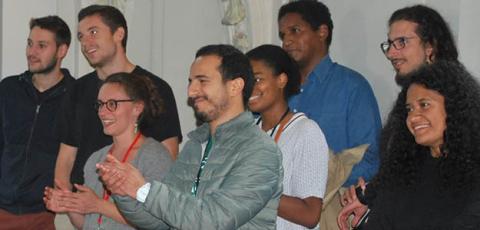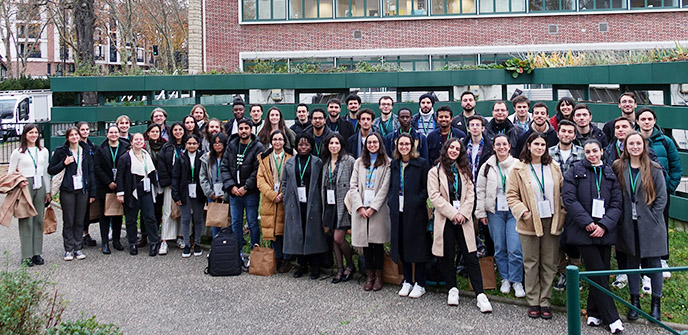New academic year for PhD students: IFPEN promotes training through research

IFPEN welcomed some fifty new PhD students on 23 and 24 November. Over the course of these two days, the new arrivals got the opportunity to familiarize themselves with their new environment, visit laboratories and develop a team spirit from the outset. There has been an increase in the number of funded theses at IFPEN to support the development of new themes associated with the ecological, energy and digital transition.

An increase in resources dedicated to PhD theses
In order to keep pace with the emergence of new research themes, IFPEN has decided to ramp up the funding available for theses. The number of PhD students recruited in-house increased from 45 to 50 in 2023. The number will rise again in 2024 to 55. To these are added PhD students recruited by partners who also work on its research themes.
To conduct their research, all PhD students have access to cutting-edge equipment for their experiments and significant computing resources for numerical simulations.
A diversifying research policy
The research activities conducted at IFPEN today cover a very broad range of themes, including energy storage, floating windfarm simulation, biofuels development, plastics recycling, environmental monitoring,for geothermal energy, water treatment, hydrogen powertrains, electric machines, as well as carbon storage and capture, alongside a range of more cross-disciplinary domains such as applied mathematics. A significant proportion of this research includes both experimental and modeling aspects.
The Yves Chauvin thesis prize
The first day of the new academic year culminated in the awarding of the Yves Chauvin prize for the best IFPEN thesis defended last year. The annual Yves Chauvin thesis prize is intended to create a spirit of emulation and is awarded by a jury chaired by the President of IFPEN’s Scientific Board.
Doctoral programs at IFPEN
IFPEN’s thesis topics are drawn up by the Institute’s researchers. Once validated by IFPEN’s Scientific Board and prioritized/selected by the Scientific Management and the General Management, these topics are published at the start of the civil year. Thesis activities generally begin in November, with the research conducted either on IFPEN premises (at its Rueil-Malmaison site in Paris or the Solaize site in Lyon), or in partner laboratories that have current agreements with IFPEN.
Each PhD student benefits from a double supervision, by both the IFPEN thesis sponsor and by the thesis supervisor, who is a member of a doctoral school.
PhD students at IFPEN benefit from dedicated doctoral programs complementary to their thesis research activities, enabling them to reinforce their knowledge in IFPEN’s fields of activity and preparing their professional integration. In addition, IFPEN’s association of current and former PhD students offers useful advice, as well as the support of a stimulating and active network.
Driven by the growing number of theses and the creativity of a constantly renewed pool of these young talents, innovation at IFPEN continues to support the rapid development of sectors linked to new low-carbon energies, sustainable mobility and the environment.
Training in and through research has always been an important pillar of IFPEN’s scientific policy. It has taken on even greater importance in recent years with the emergence of new research themes and the increase in the number of PhD students recruited each year, in addition to doctoral students working on our subjects but recruited by partners. Supporting these young researchers by offering them cross-disciplinary programs and events that complement their doctoral research is a great pleasure for me, but also a constant challenge. Doctoral programs and their practical implementation are regularly adapted to remain in step with the skills needed as well as the aspirations of students. Our latest innovation is a dedicated web space, where we will present our current and future thesis topics, and where each PhD student will have a personal space enabling them to introduce themselves and report on their activities and scientific results. This new feature will also help our PhD students in their future job search, in conjunction with our annual Doc'Days event bringing together doctoral researchers and companies in the sectors concerned by our activities.
Training young PhD students to fully embrace their role as key research and innovation players, both in France and internationally, is a source of great satisfaction and sense of accomplishment for us all. We thank them for their contributions and their commitment to accelerating the energy and ecological transitions through their research work.
Andreas Ehinger, Doctoral Program Director